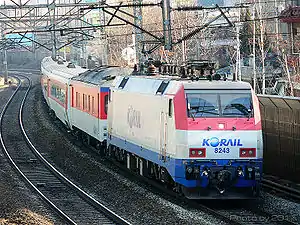Korail Class 8200
Korail Class 8200 is a South Korean electric locomotive operated by the Korean national railroad operator Korail. This locomotive has HEP capabilities in place of a dynamo car, which could be used with up to 12 passenger cars. The EL 8200 is the successor model of the EL 8100, which was introduced back in 1999.
| Korail Class 8200 | |||||||||||||||||||||||
|---|---|---|---|---|---|---|---|---|---|---|---|---|---|---|---|---|---|---|---|---|---|---|---|
 EL 8243 at Singil Station | |||||||||||||||||||||||
| |||||||||||||||||||||||
| |||||||||||||||||||||||
| |||||||||||||||||||||||
| |||||||||||||||||||||||
Technical details
This locomotive is based on the Siemens EuroSprinter model ES64F, assembled by Rotem. With four 1300 kW electric motors, the total power output is 5200 kW. The maximum speed is 150 km/h, although changing the bogies would allow 220 km/h.
Running lines
After the introduction of the 8200, Korail made a trial run in Chungbuk Line, which had just been electrified. After electrifying several lines such as Jungang, Taebaek, Gyeongbu, Yeongdong and Honam Line, it is used for Mugunghwa trains with maximum speed of 150 km/h.
HEP Issues
The HEP feature of 8200's has caused some problems in Korea. Power generated by regenerative brake has limits, and if the locomotive has many carriages, the HEP supply will be insufficient. Because of this problem, a dynamo car is attached when operating with 5 or more passenger cars in case of emergency.